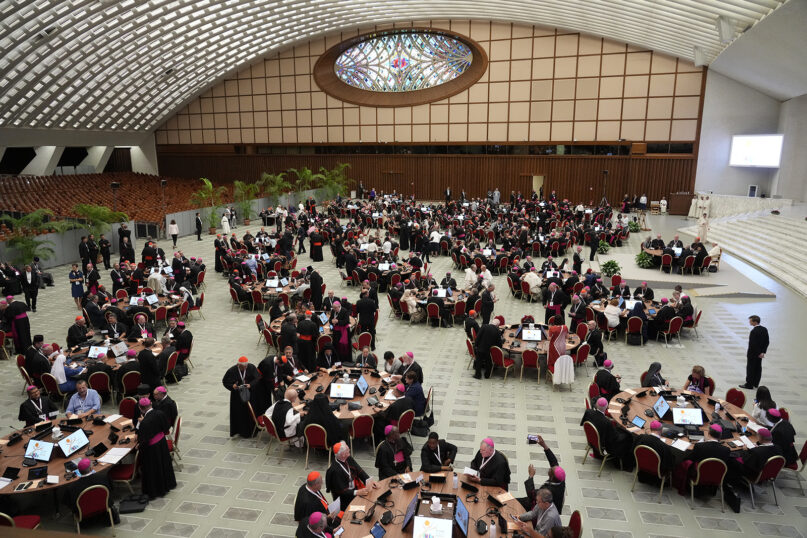VATICAN CITY (RNS) — While little news has emerged about the discussions on the Catholic Church’s future going on at the Synod on Synodality here, those sequestered in the synod’s meeting halls have made no secret of their concerns about the violence unfolding in the Holy Land. But though the consciences of the prelates, priests and laypeople appear to be shaken, opinions on how to respond to the Israel-Hamas war remain divided.
The synod, taking place at the Vatican Oct. 4-29, has been called to discuss some of the most urgent issues facing the church, including female ordination and the welcoming of LGBTQ Catholics.
The attack by Hamas terrorist forces in Israel has been a recurring topic for the 364 synod members, especially among the small working groups, insiders say, since open hostilities began Oct. 7. On Thursday (Oct. 12), synod participants prayed for peace in the Holy Land, and on Tuesday, synod organizers did not offer any of the refreshments usually laid out for participants, intending to encourage a day of fasting and prayer called for by the Latin Patriarch of Jerusalem, Cardinal Pierbattista Pizzaballa.
During Wednesday’s morning Mass for synod participants in St. Peter’s Basilica, Lithuanian Bishop Gintaras Grušas asked to pray for “those who lack peace these days: in Israel, in Palestine, in the Ukraine and in other places throughout the world. Through our prayers, let us be channels of God’s peace in today’s world.”
Some participants, saying a war taking place in the birthplace of Christianity should not be ignored, urged the assembly to issue a formal statement on the conflict. But given the diversity of the synod’s participants, the prospect was soon mired in debate, chiefly about how strongly the synod should condemn Hamas militants given Israel’s policies in Gaza and the West Bank.
The head of the Focolare Movement, Margaret Karram, who is Palestinian, said to the assembly on Thursday: “I asked myself: What am I doing here? Should I not do something else to promote peace at this time? But then I said to myself: Here too I can join Pope Francis’ call and everyone’s prayer.”
The patriarch of the Chaldean Catholic Church, Cardinal Louis Sako, whose seat is in Iraq, led prayers asking for the end of this “absurd war” before a crowd including Catholics from Baghdad, Ukraine, Moscow and Iran.
In a post on X on Wednesday, the Rev. Antonio Spadaro, undersecretary for the Vatican’s Dicastery for Culture and Education, commented on the challenges facing the synod’s working groups in a climate of war and division. “This is also the evangelical power of the synod,” he wrote. Sitting at a discussion table with prelates from Russia and Ukraine, he said, “it’s clear to me that we are openly challenging the leading bperspective of society, which reduces consent to power tactics,” he said.
Ukrainian Catholics said a statement on the crisis in the Holy Land should include a pronouncement on the war in their country after the invasion by Russian forces. Synod participants from Africa pointed to the conflicts in South Sudan, Burkina Faso, Ethiopia and the many other often forgotten African countries, asking whether they should be given equal attention.
“Recently the Holy Father said that we are celebrating this synod in a time of war,” said Cardinal Mario Grech, the secretary-general of the synod, in an online post Tuesday. “During these days some of the members of the synod underlined that in their countries there are conflicts, tensions and wars so we are here to pray every day, we are praying to the Lord to send the gift of peace to all.”
#Synod2023 Participants join Cardinal Pierbattista Pizzaballa, Latin Patriarch of Jerusalem, and all the Ordinaries of the Holy Land in a day of fasting, abstinence, and prayer for peace in Israel and Palestine.#ListeninigChurch #WalkingTogether #SacredSilence@clicktoprayapp pic.twitter.com/4AT5wyQnLu
— Synod.va (@Synod_va) October 17, 2023
The synod has felt outside pressure to make a statement on the war as well. Rabbi Noam Marans, the American Jewish Committee’s director of interreligious and intergroup relations, chided the synod in an interview with the Italian newspaper Il Messaggero for failing to condemn “the inhuman atrocities of Hamas,” calling it “a missed opportunity for moral clarity.”
If the synod manages to publish a statement on the war in Israel, some participants said, it may be drafted by the head of the Catholic community in Ukraine, Major Archbishop Sviatoslav Shevchuk. While the Vatican and Francis have, as has become custom, maintained a degree of impartiality in the hopes of mediating a peace between Israel and Hamas, the Ukrainian Catholic Church did not hesitate to condemn Hamas’ attack, which it described as “a terrorist movement.”
Francis renewed his appeals for peace at his general audience on Wednesday, expressing his fear that the conflict will expand, in a global context where there are already many wars. “I urge faithful to take only one side in this conflict: the side of peace; not in words, but with prayer and total dedication,” he said.
The pope also called for Oct. 27 to be a day of fasting and prayer for all Christian denominations and people of all faiths as well as anyone who takes to heart the cause for peace. With or without a statement, it’s likely that synod participants will take part in the event.





